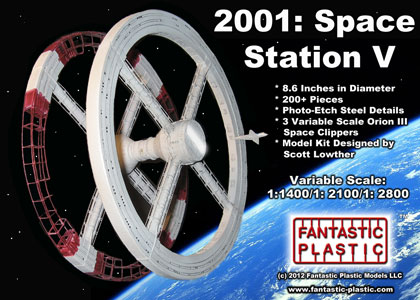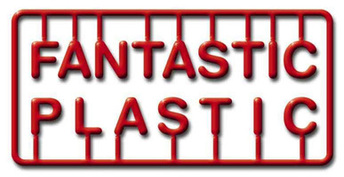Space Station V from "2001: A Space Odyssey" (1968)
About the Design
Stanley Kubrick's "2001: A Space Odyssey" (1968) is universally recognized as one of the most influential science fiction movies of all time. A visual masterpiece, the film -- co-written by Kubrick and science-fiction demi-god Arthur C. Clarke -- was the first sci-fi film to painstakingly recreate the look, feel and physics of actual space flight, at least as it was understood in the mid-1960s. Its near-future spacecraft were so technically spot-on that many aerospace experts don't consider them science-fiction at all, but as speculative designs as legitimate as the proposals put forth at the time by Douglas, Boeing and other aerospace companies.
One of the most iconic pieces in the film was Space Station V, the first stop on Dr. Heywood Floyd's trip to the moon. Inspired by Dr. Werner von Braun's "wheel" stations of the 1950s, the station created artificial gravity through centrifugal force. This required approaching spacecraft to spin in time with the station's rotation, resulting in a cosmic "dance" Kubrick so memorably backed with Johann Strauss' "The Blue Danube." The space station's size remains an issue of much dispute. Many film historians insist it was supposed to be 1,000 fee in diameter. But this made the approaching Orion III spaceplane look too large in comparison, so Kubrick reportedly reduced the Orion III's size optically, making the station appear 2,000 feet in diameter. |
About the Kit
This Fantastic Plastic kit was released in June 2012. As "screen accurate" as possible, the model was designed in CAD by Scott Lowther and cast by Mana Studios. The complex photo-etch steel details were produced by ParaGraphix.
Because the "actual" space station's size remains in dispute, designer Scott Lowther came up with an elegant solution:Produce Orion III Space Clippers in different scales against which the 8.6-inch model could be judged. Hence the kit includes three Orion III's, one in 1:1400 to suggest a 1,000-foot-diameter station, one in 1:2800 to suggest a 2,000-foot-diameter station and, for people who like to split the difference, one in 1:2100 scale, suggesting a 1,500-foot-diameter station. This model uses the 1:2100 Orion III. |



